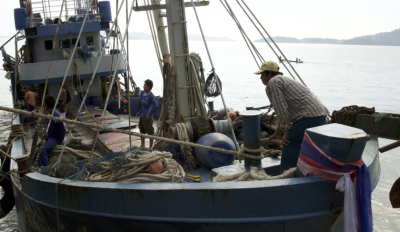
Publication Date:
Photo courtesy of Daniel Murphy
This report contains the comments of the Seafood Working Group (SWG) concerning the Government of Thailand’s ranking in the United States Department of State’s 2022 Trafficking in Persons (TIP) Report. The TIP Report is a requirement of the Trafficking Victims Protection Act (TVPA). In 2022, the U.S. Department of State upgraded Thailand from Tier 2 Watchlist to Tier 2 ranking because the government “does not fully meet the minimum standards for the elimination of trafficking but is making significant efforts to do so” and has “demonstrated overall increasing efforts compared with the previous reporting period, considering the impact of the COVID-19 pandemic on its anti-trafficking capacity.”
The SWG recommends that Thailand be placed on the Tier 2 Watchlist in 2023. The Government of Thailand continues to fall short of the TVPA minimum standards, demonstrated by its failure to meet the majority of the 12 indicia of “serious and sustained efforts.” In addition, the government has not provided evidence of increasing efforts to combat severe forms of trafficking in persons compared to the previous reporting period, continuing to not effectively address the underlying drivers of forced labor highlighted in the SWG’s 2022 Comments on Thailand, nor to adequately adopt the majority of the TIP Office’s Prioritized Recommendations from the 2022 TIP Report.
A significant portion of survivors of forced labor in Thailand are migrant workers, yet the Government of Thailand has not taken proportional concrete actions to address their situation and instead has taken actions that increase migrant workers’ risk of forced labor. The government has not fulfilled its promise to grant migrant workers the right to form and lead unions, strengthened measures to prevent strategic lawsuits against public participation (SLAPP) that target migrant workers and human rights defenders, or established a long-term, comprehensive migration management policy necessary to promote fair and safe migration for decent work.
Meanwhile, the government has not adequately implemented its new anti-trafficking policies intended to strengthen survivor identification nor strengthened its labor inspections of fishing vessels, seafood processing factories, and other worksites. Instead, law enforcement officials have continued to criminalize undocumented migrant workers who face a high risk of extortion, arrest, detention, and deportation for immigration offenses.
Furthermore, the government has permitted the proliferation of informal broker networks that facilitate forced labor schemes by insufficiently regulating unlicensed brokers and complicit officials. Law enforcement officials have also continued to not vigorously investigate and prosecute cases of forced labor under Section 6/1 of the Anti-Human Trafficking Act, instead tending to treat potential forced labor cases as labor disputes that are resolved through an informal mediation process that disadvantages workers while favoring employers.
Priority Recommendations
In order for Thailand to remain at Tier 2 ranking, the SWG recommends that the Government of Thailand undertake the following reforms, taking concrete steps to do so by June 2023:
- Freedom of association for migrant workers. The government should fulfill its promise from 2022 to amend the Labour Relations Act, B.E. 2518 (1975), to allow all workers, including migrant workers, the right to form and lead labor unions. The government should also ratify the ILO Conventions on the Freedom of Association and Protection of the Right to Organize, 1948 (C87) and the Right to Organize and Collective Bargaining, 1949 (C98).
- Long-term migration policy for decent work and regulation of unlicensed brokers. The government should work with civil society to establish a long-term, comprehensive labor migration management policy for migrant workers from neighboring Southeast Asian countries that promotes fair and safe migration for decent work and eliminates recruitment fees and related costs, in line with international standards and in coordination with sending countries. In the meantime, the government should more strictly regulate unlicensed brokers, along with any complicit government officials who take advantage of the current short-term migration management policies to exploit migrant workers.
- Improved rollout of the new National Referral Mechanism (NRM) and Standard Operating Procedures (SOPs) at the local level through officer training and accountability. The government should strengthen the implementation of new policies intended to strengthen survivor identification, including the new NRM and SOPs for initial survivor identification of labor trafficking and Section 6/1 offenses, by investing in the capacity building of officers at the local level and holding them accountable. Officer training should focus on less understood indicators of forced labor, such as debt bondage, withholding of wages, and document retention.
- Survivor-focused and trauma-informed responses to survivors, including non-punishment of survivors. The government should follow the UN guidelines on the non-punishment of survivors of human trafficking by not arresting, detaining, and deporting potential survivors for immigration offenses, among other measures, to treat survivors in a survivor-focused and trauma-informed manner.
- Strengthened labor inspections. The Ministry of Labour should establish regular, rigorous labor inspections, during which inspectors should engage directly with workers in a meaningful way, particularly in high-risk workplaces dominated by migrant workers. Worker organizations and civil society organizations should be involved in the inspection process.

